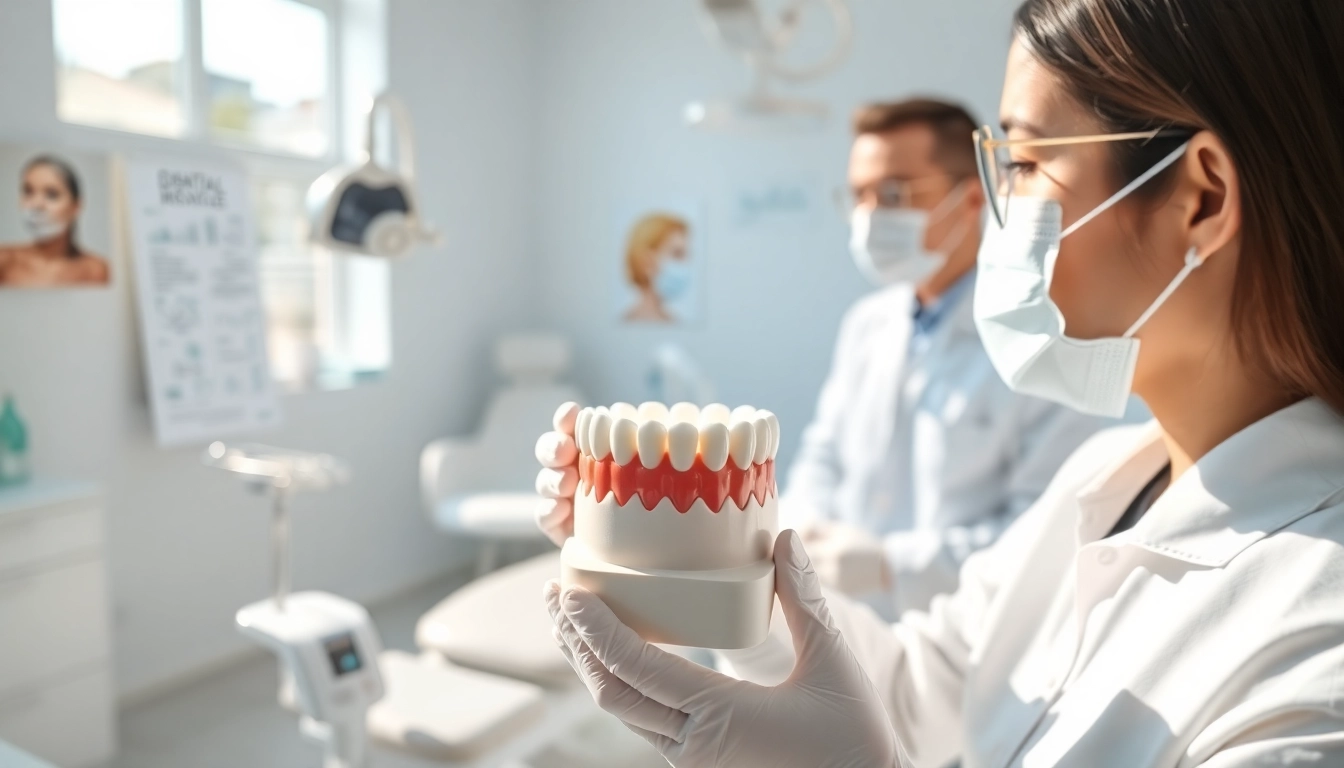What Are Dental Crowns?
Definition and Purpose of Crowns
Dental crowns are tooth-shaped caps that fit over an existing tooth to restore its shape, size, strength, and appearance. They serve a crucial role in dentistry, providing a protective covering for damaged or decayed teeth. Unlike fillings, which merely fill cavities, crowns encapsulate the entire tooth structure. The primary purpose of a crown is to prolong the life of a tooth that has sustained significant wear or damage, effectively reinforcing its integrity and function. For those seeking effective restoration options for their dental health, crowns are often an indispensable solution. Many dental professionals recommend crowns for patients with various dental issues, as they can also improve aesthetic appeal by matching the color and shape of natural teeth.
Why Dental Crowns Are Necessary
Dental crowns are necessary for several reasons, including:
- Support for Weak Teeth: Teeth weakened by decay or large fillings benefit from crowns that help restore structure and provide support.
- Protection After Root Canal: Following a root canal treatment, a tooth is often left vulnerable. Crowns protect the tooth and prevent it from fracturing.
- Enhance Aesthetics: Crowns can also be used to improve the appearance of discolored or misshaped teeth, leading to a more uniform smile.
- Comprehensive Coverage: Crowns provide complete coverage, which is particularly useful for restoring a tooth that has been severely damaged or compromised.
Common Types of Crowns Available
There are several types of dental crowns available, each with unique benefits and construction materials. Some common types include:
- Porcelain Crowns: These crowns are favored for their aesthetic qualities, matching the natural color of teeth, making them ideal for front teeth.
- Metal Crowns: Made from alloys, metal crowns are incredibly strong and durable, making them suitable for back teeth where pressure from chewing is greatest.
- Porcelain-Fused-to-Metal Crowns: These crowns offer both durability and aesthetics since they contain a metal base covered by porcelain.
- All-Resin Crowns: Made entirely of resin material, these crowns are less expensive but less durable than other types. They are often used as temporary solutions.
The Dental Crown Procedure: Step-by-Step
Initial Consultation and Assessment
The first step in the dental crown procedure involves a comprehensive assessment by your dentist. During this initial consultation, a dental professional will evaluate the condition of your tooth and discuss your treatment options. X-rays may be taken to determine the extent of decay or damage. If a crown is deemed necessary, your dentist will explain the procedure, discuss the types of crowns available, and what you can expect throughout the process.
Preparation of the Tooth for Crown Placement
Once a crown is decided upon, the tooth in question must be prepared. Preparation involves several steps:
- Shaping the Tooth: Your dentist will remove a portion of the tooth’s outer structure to create space for the crown.
- Taking Impressions: Impressions of your teeth will be taken to ensure the crown fits perfectly. This may be done using a traditional mold or digital scanning technology.
- Temporary Crown Placement: A temporary crown may be placed while your permanent crown is being fabricated to protect the prepared tooth.
Final Placement and Adjustments
After the custom crown is prepared, which generally takes a couple of weeks, you’ll return for a final appointment. During this visit, your dentist will:
- Fit the Crown: The crown will be placed over the tooth to ensure it fits comfortably and securely.
- Make Adjustments: Any necessary adjustments for bite and aesthetics will be made before permanently cementing the crown in place.
- Cementing the Crown: Once perfected, the permanent dental cement will adhere the crown to your tooth securely.
Types of Dental Crowns: Which One Is Right for You?
Porcelain vs. Metal Crowns
Choosing between porcelain and metal crowns depends on several factors, including the location of the tooth, the extent of the damage, and personal aesthetic preferences.
Porcelain crowns are typically recommended for visible teeth due to their natural appearance. In contrast, metal crowns are usually preferred for molars because of their durability and strength. Each type serves distinct purposes and knowing the differences can help in making an informed choice.
Temporary Crowns: When and Why
Temporary crowns are employed during the waiting period for your permanent crown. They serve crucial functions:
- Protect the prepared tooth.
- Maintain the position of surrounding teeth.
- Provide a functional solution while waiting for the custom crown.
Although temporary crowns are not designed for long-term use, they are a necessary step in the crown placement process.
Factors Influencing Crown Selection
Several factors influence the selection of dental crowns:
- Tooth Location: Aesthetic considerations for front teeth often lead to the use of porcelain crowns, while back teeth may require the strength of metal crowns.
- Extent of Damage: Significant tooth damage may necessitate a stronger crown material.
- Budget: Options vary in cost, and understanding your insurance coverage can help guide your choice.
- Personal Preferences: Some patients prefer specific materials based on comfort, resilience, or aesthetics.
Care and Maintenance for Dental Crowns
Best Practices for Oral Hygiene with Crowns
Maintaining oral hygiene with dental crowns is essential to ensure their longevity and function. Here are some best practices:
- Regular Brushing and Flossing: Clean around the crown and under the gum line as thoroughly as possible to prevent plaque accumulation.
- Use a Non-Abrasive Toothpaste: A mild toothpaste will prevent damaging the crown’s surface.
- Regular Dental Checkups: Schedule regular visits with your dentist for cleanings and assessments to monitor the condition of your crowns.
Avoiding Common Mistakes
To prolong the life of your crowns, consider avoiding the following common mistakes:
- Avoid Hard Foods: Biting down on hard candies or ice can crack or dislodge crowns.
- Limit Staining Agents: Highly pigmented foods and drinks can stain crowns over time, particularly those made from porcelain.
- Don’t Skip Dental Visits: Regular checkups ensure early detection of issues that might compromise your crowns’ integrity.
Monitoring and When to See Your Dentist
Monitor your crowns for any signs of discomfort or looseness. Key signs that indicate you should consult your dentist include:
- Persistent sensitivity to hot or cold.
- Visible cracks or chips.
- A feeling of looseness, which may suggest that the crown is no longer secure.
Early intervention can prevent more extensive dental issues down the line.
Costs and Insurance for Dental Crowns
Understanding the Costs Involved
The cost of dental crowns can vary widely based on several factors:
- Material Used: Porcelain crowns typically range from $800 to $3,000, while metal crowns can cost between $500 to $1,500.
- Location and Dental Practice: Geographic location and the specific dental practice can affect pricing as well.
- Complexity of the Case: Additional treatments, such as root canals or tooth extractions, can increase the overall cost.
Insurance Coverage and Financing Options
Many dental insurance plans provide coverage for crowns, though co-pays and deductibles will apply. Typically, they may cover a percentage of the procedure costs. Additionally, many dental offices offer financing options to manage out-of-pocket expenses, making treatment more accessible for patients. Always consult with your insurance provider and dental office to understand the specifics of your coverage.
Budgeting for Your Dental Health Needs
When budgeting for dental crowns, consider the following tips:
- Check Your Insurance Benefits: Understand what your plan covers to avoid unexpected costs.
- Ask About Payment Plans: Your dental office may provide flexible payment options to ease financial burden.
- Account for Maintenance: Include regular checkups and maintenance in your dental health budget, as these are vital for extending the life of your crowns.





